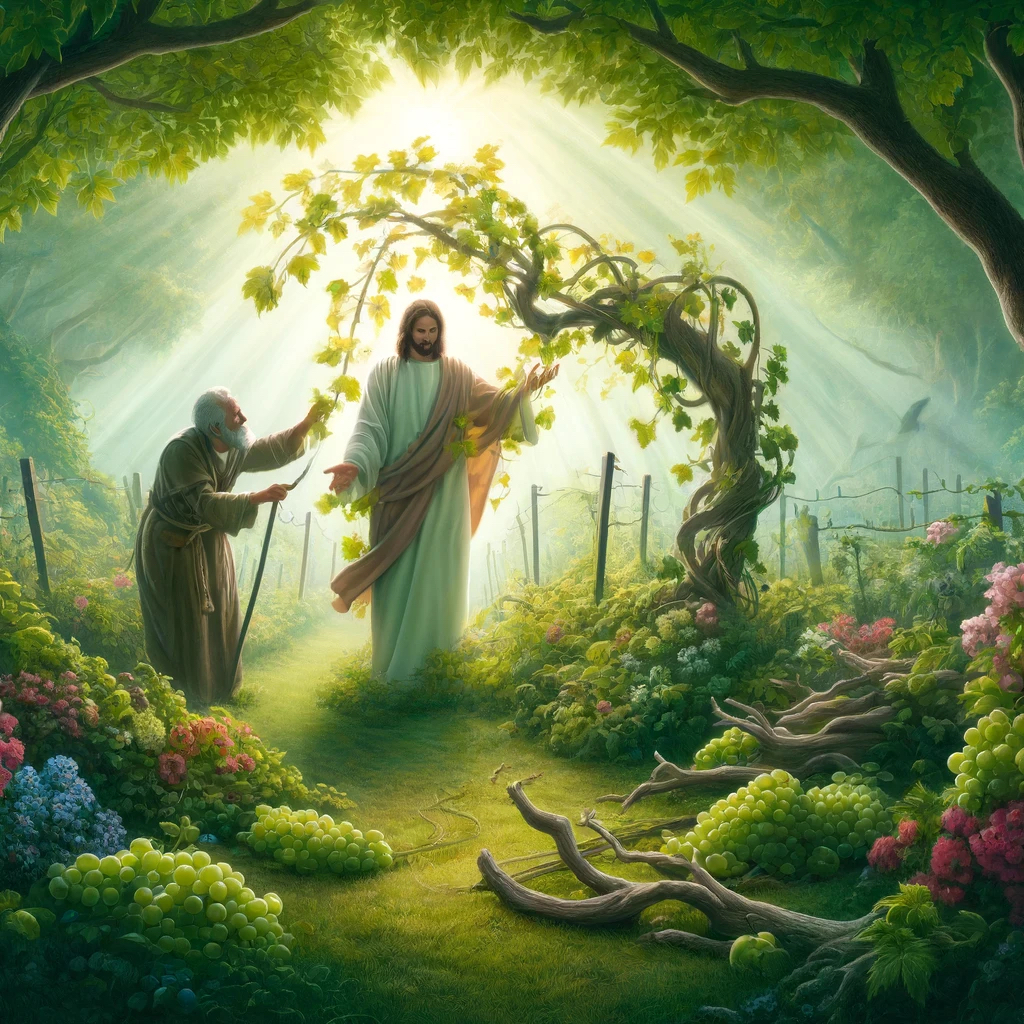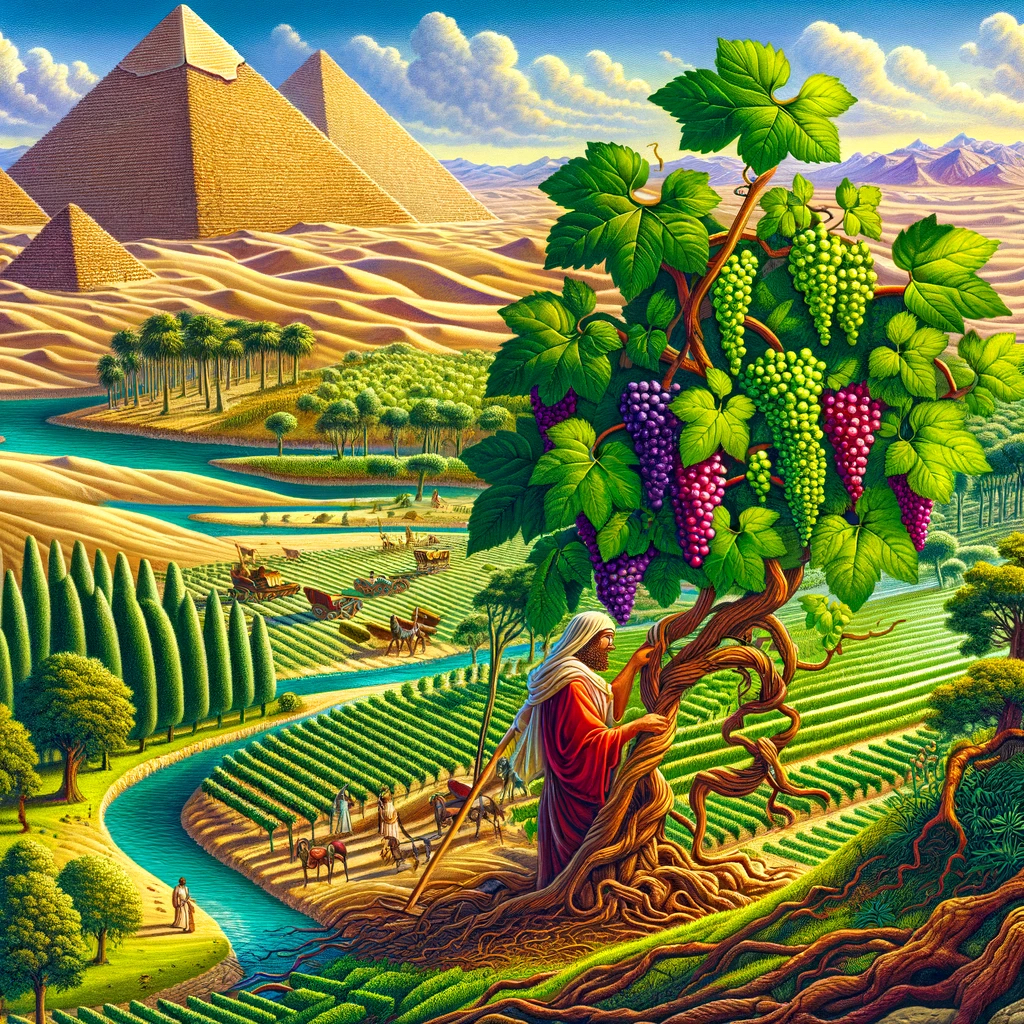“我是真葡萄树,我父是栽培的人。凡属我不结果子的枝子,他就剪去;凡结果子的,他就修理干净,使枝子结果子更多。现在你们因我讲给你们的道,已经干净了。你们要常在我里面,我也常在你们里面。枝子若不常在葡萄树上,自己就不能结果子;你们若不常在我里面,也是这样。我是葡萄树,你们是枝子。常在我里面的,我也常在他里面,这人就多结果子;因为离了我,你们就不能作什么。人若不常在我里面,就像枝子丢在外面枯干,人拾起来,扔在火里烧了。你们若常在我里面,我的话也常在你们里面,凡你们所愿意的,祈求,就给你们成就。你们多结果子,我父就因此得荣耀,你们也就是我的门徒了。(约翰福音 15:1-8 和合本)

这是我们很熟悉的一段经文,下面仅从如下几个方面讨论一下,彼此加深对主耶稣教导的理解:
- 1、我是真葡萄树,我父是栽培的人:这是一个熟悉的象征。在古希伯来语经卷中,上帝反复使用葡萄树作为祂子民的象征,比如诗篇80:8-9,你从埃及挪出一棵葡萄树,赶出外邦人,把这树栽上。你在这树根前预备了地方,它就深深扎根,爬满了地。这让我们想到了什么?神将以色列人从埃及为奴之家带出并进入迦南美地这一过程比喻为‘移植’了一棵葡萄树,是不是非常形象?

- 2、在古以色列到处都有葡萄树,在自家院子里就种着,人们在树下吃饭、休闲(人人都要坐在自己葡萄树下和无花果树下,无人惊吓。这是万军之耶和华亲口说的。(弥迦书 4:4 和合本))。圣殿前面有一棵大大的金色葡萄树作为显著的装饰,传达出以色列是神的葡萄树的意思,进而在新约时代,“葡萄树也是公认的弥赛亚的象征”。(杜兹)
- 3、你们多结果子,我父就因此得荣耀,你们也就是我的门徒了。如果我们要为神结果子,这个‘果子’包含的意思不单单是传福音,不单单是请慕道友进入教会,也不是指扎根于以色列这个族群,甚至也不是指扎根在某个教会。这是一种完全融入基督、完全以耶稣基督为自己带领者、内化在我们心中以及展现出来的满有基督形象的言行。我们必须在祂里面扎根,在这个过程中必然要除去我们心中的污秽,成为洁净的器皿,那些不讨主喜悦的则无法与基督同为‘肢体’,结局就是被丢弃成为枯枝。与基督彼此联合的也必会像基督一般结出丰硕的葡萄。
- 4、在神与祂子民之间关系中,葡萄树与枝子的关系是完全的依靠和持续不断的连接。枝子倚靠葡萄树,比羊倚靠牧人或孩子倚靠父亲有更深一层的含义。当耶稣要离开门徒的时候,祂也以此为劝勉,祂会与门徒们保持合一,门徒们也会与祂保持合一,就像枝子与葡萄树干相连一样。
弟兄姐妹们,你现在仅是委身于教会吗?还是扎根于耶稣基督里呢?你是那一支与祂紧密相连的葡萄枝吗?抑或是已经被丢弃枯干了呢?请为此祷告。
(如有建议敬请留言讨论,邮箱:[email protected])
Jesus Is the True Vine – Who Is Connected to It?
“I am the true vine, and My Father is the vinedresser. Every branch in Me that does not bear fruit He takes away; and every branch that bears fruit He prunes, that it may bear more fruit. You are already clean because of the word which I have spoken to you. Abide in Me, and I in you. As the branch cannot bear fruit of itself, unless it abides in the vine, neither can you, unless you abide in Me. “I am the vine, you are the branches. He who abides in Me, and I in him, bears much fruit; for without Me you can do nothing. If anyone does not abide in Me, he is cast out as a branch and is withered; and they gather them and throw them into the fire, and they are burned. If you abide in Me, and My words abide in you, you will ask what you desire, and it shall be done for you. By this My Father is glorified, that you bear much fruit; so you will be My disciples.(John 15:1-8 NKJV)

This is a well-known passage. Below, let’s explore several aspects to deepen our understanding of Jesus’ teaching:
- “I am the true vine, and my Father is the vinedresser”: This is a familiar symbol. In the Hebrew Scriptures, God repeatedly uses the imagery of a vineyard to represent His people. For example, in Psalm 80:8–9, God describes how He led a vine out of Egypt, drove out the Gentiles, and planted it. The vine took root and spread across the land. What does this remind us of? God’s act of “transplanting” Israel from the bondage of Egypt into the Promised Land is vividly portrayed as the planting of a vine—a striking and familiar picture.

- Vineyards in Ancient Israel: In ancient Israel, vineyards were common—people grew grapevines in their own courtyards and gathered beneath them to eat and relax (“everyone will sit under their own vine and fig tree, and no one will make them afraid,” as declared by the Lord of Hosts in Micah 4:4, Chinese Union Version). In front of the temple, there was even a large golden vine displayed as a prominent decoration to signify that Israel was God’s vineyard. In the New Testament era, the vine became a recognized symbol of the Messiah. (See Duz for further commentary.)
- “You bear much fruit, and in this way my Father is glorified, and you become my disciples”: When we speak of bearing fruit for God, the “fruit” does not merely refer to evangelism, inviting seekers to the church, or even being rooted solely within the Israelite community or a specific congregation. Rather, it signifies a complete integration into Christ, making Him our leader; it is about internalizing Him in our hearts and exhibiting His character in our words and actions. We must be rooted in Him—and in the process, all that is unclean in our hearts must be removed so we become vessels fit for Him. Those actions that do not please the Lord cannot remain as part of His “body” and will ultimately be discarded as withered branches. Only those branches that remain united with Christ will bear abundant fruit, reflecting the likeness of Christ.
- The Relationship Between the Vine and the Branches: In the relationship between God and His people, the connection between the vine and the branches is one of complete dependence and continual, abiding union. A branch’s reliance on the vine carries a deeper significance than a sheep depending on its shepherd or a child depending on its father. When Jesus was about to depart from His disciples, He used this image as an exhortation: He would remain united with His disciples, and they with Him, just as the branches remain inseparably attached to the vine.
Brothers and sisters, are you merely committed to the church, or are you truly rooted in Jesus Christ? Are you the branch that remains closely connected to Him, or have you been cast off as a withered branch? Please pray about this.
-
大洋国的人究竟是主人还是奴隶?(EN ver. inside)
文/HuSir 在大洋国,人们从小就被一种温暖而坚定的国家叙事包裹:我们与国家是一体的,政府永远代表人民,…
-
梦中的大洋国:为什么我们需要重新学会思考与自由(EN ver. inside)
文/HuSir 注释:本文中的「大洋国」并非指任何现实国家,而是一种心灵状态:当信息被过滤、思想被统一、人被当…
-
批判性思维与自由:写给在恐惧中生活的大洋国人(EN ver. inside)
文/HuSir 在大洋国,很多人一生都在遵守规则,顺从权力,在各种大小制度的夹缝间努力维持生活。他们相信,…
-
大洋国的韭菜们为什么越来越害怕未来?
——写给正在努力生活的普通人 文/HuSir 这几年,很多人都有一种说不出来的体会:只要事情办的进度稍微慢…
-
如何在混乱时代快速识别:伊斯兰信仰 vs 伊斯兰原教旨主义?(EN ver. inside)
文/HuSir 过去十年,欧洲、北美乃至大洋国社会,都经历了一场剧烈变化:大规模移民、难民涌入、多元文化加…
-
重生的本质:当圣灵成为一个人自由的思想(EN ver. inside)
文/HuSir 许多基督徒在受洗时以为自己只是完成了一项仪式,仿佛只是换了一个宗教身份,加入了一个新的群体…
-
在黑暗中坚守信仰:北朝鲜基督教百年简史与极权样貌(EN ver. inside)
文/HuSir 在我们的世界上,有些地方的信仰是自由的选择,而在另一些地方,信仰意味着用生命作代价。朝鲜半…
-
梦中的大洋国(EN ver. inside)
文/HuSir 我如今生活在一个自由的国度。那里的街道宽阔而安静,阳光透过高大的枫树洒在路面上,孩子在草地…
-
当教育家被悼念:我们在悼念谁的良知?(EN ver. inside)
文/HuSir 简介:刘道玉(1933年—2025),湖北枣阳人,著名教育家、化学家。1981至1988年担任…
-
当信仰未能医治身体:中年信徒的属灵困境(EN ver. inside)
文/HuSir 在大洋国的家庭教会中,有一个令人心疼又无奈的普遍现象:相当多的基督徒在信主多年、灵命看似稳…
-
职场不公与思想的贫乏
文/HuSir 在每一个职场中,都存在着不同层次的不公与权力游戏。有些人得势后沾沾自喜,有些人处于被支配与…
-
每天的重复,是天堂的延续还是地狱的循环?(EN ver. inside)
文/HuSir 我们每天都在重复怎样的生活?早起、通勤、工作、应付、沉默、回家……时间像一条不息的河流,把…

发表回复